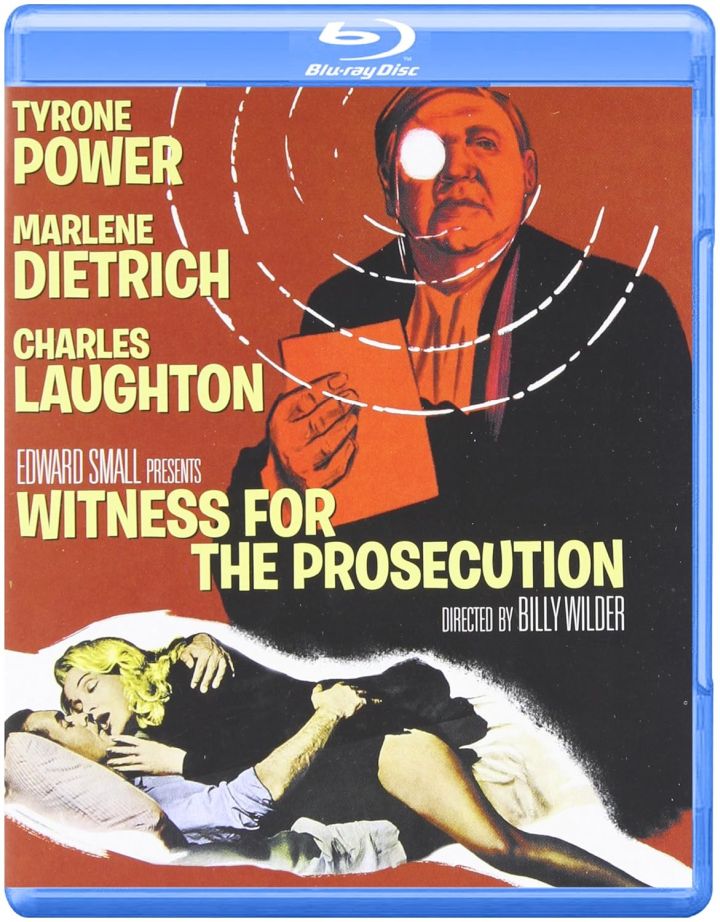
A filmed courtroom drama has a double-edged sword. It’s of course easy drama, the conflict is already fixed. Defense vs. Prosecution. Lawyer vs. Witness. A clearly defined outcome – innocent or guilty. But it’s also a very static environment. Everybody’s seated and looking in one direction. It all takes place in one room. There are bailiffs there whose entire job is to make sure nothing violently surprising happens.
Buy Witness for the Prosecution (Special Edition) Blu-raySo, the drama has to come from dialogue. The cinema has to come from faces and character. Witness for the Prosecution (1957), Billy Wilder’s adaptation of Agatha Christie’s hit play, is rife with character. Every member of the small cast is distinct and individual.
Pre-eminent is barrister Sir Wilfred Robarts. Played with magnetic irascibility by Charles Laughton, Sir Wilfred is just coming out from the hospital, officious Nurse Plimsoll in tow. She is played by Elsa Lanchester, perhaps best known as the title character from Bride of Frankenstein. Sir Wilfred has survived a heart attack, and doctors have stripped from him all his pleasures. No alcohol, no cigars, no murder cases.
But then the front headline comes walking in the door. Leonard Vole is accused of murdering wealthy widow Emily French. Vole, married but kind of a wastrel, admits befriending French. He spent a lot of attention on her because she might help fund some stupid invention of his.
He was at her house on the night her head was bludgeoned in. He admits it. But his wife will testify he came home well before the woman was killed. Anyway, there’s no motive… until it is revealed he’d recently become the main beneficiary in the old woman’s will. It looks bad, but there’s the wife’s testimony. Which reassures Sir Wilfred… until he meets the wife.
Marlene Dietrich plays Christine Vole. She’s German (Leonard met her after the war.) She’s cold, and bloodless. And when Wilfred interviews her to get her story, he feels like everything she says in defense of Vole is a lie. And she’s cagey. “Do not worry. I will be very convincing,” she says, in a deeply unconvincing manner.
What she ends up as is the title character, which is the last twist in the story I’m willing to spoil. Witness for the Prosecution is based on a play and does not try to run from that provenance. It moves with mostly the rhythms of a play, with long scenes in a few locations. That makes it dependent on the actors and they are universally stellar.
Charles Laughton is, of course, at the center. He was an eccentric actor with a reputation for being difficult. Director Billy Wilder reportedly found him a complete delight, even coming on set when he wasn’t required to work with the other actors. His performance is wonderful as a powerful man laid low by a heart attack. He’s bluff, blowhardy, but often giving hints that his prowess is an act, and he is in fact near the end of his rope. He defiantly sneaks cigars but has a minor coughing fit around the edges of one scene. But he is still quick witted, and even though he’s regularly late to court, he’s ready to ply his defense. Marlene Dietrich is another terrific performance, hiding deep passion beneath the mask of a Teutonic ice queen.
For a modern audience, what the film might have going against it is an over-familiarity with the style of story. Anyone watching television growing up has seen dozens of courtroom dramas. Anyone who follows the law knows that surprise witnesses and sudden evidence investigated during the trial is not how proper justice systems work. There’s a few of those in here. They’re great drama, but they’re not real.
However, Witness for the Prosecution has great forward propulsion. There’s constant little conflicts from the beginning, notwithstanding the big fight in the courtroom. Sir Wilfred fights his nurse, his staff, schemes for and against his friends, and always has something going on. It makes the big climax better… but I’m not going to say more. At the end of the movie, a narrator asks the audience not to spoil the ending. If I write any more, I will, so I won’t.
There’s no indication that this new release of the Blu-ray has a new restoration. The original Blu-ray was put out by Kino Lorber in 2014. There are some scenes that are noticeably softer than others. I have not seen the older Blu-ray, so I do not have any indication that this is an improvement. That said, this release looks pretty good, with the aforementioned soft scenes standing out since most of the material is clean, with beautiful contrast.
I thoroughly enjoyed Witness for the Prosecution. It’s briskly paced, with fun character interactions that evolve, and a big ‘ol plot that has plenty of fun twists. It’s old fashioned as hell. It was probably old-fashioned when it was made, but it’s the best sort of filmed play. There are scenes that couldn’t be done on stage, but there’s no ridiculous attempt to “open the play.” Billy Wilder doesn’t try to be flashy or too innovative with his direction. He’s just good.
Witness for the Prosecution has been released on Blu-ray by Kino Lorber Studio Classics. Extras on the disc include a commentary, new for this release, by film historian Joseph McBride, and an archive featurette, “Billy Wilder and Volker Schlondorff discuss Witness for the Prosecution” (7 min).